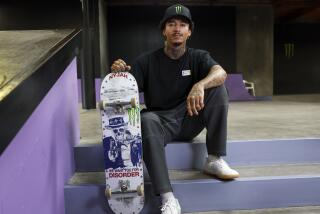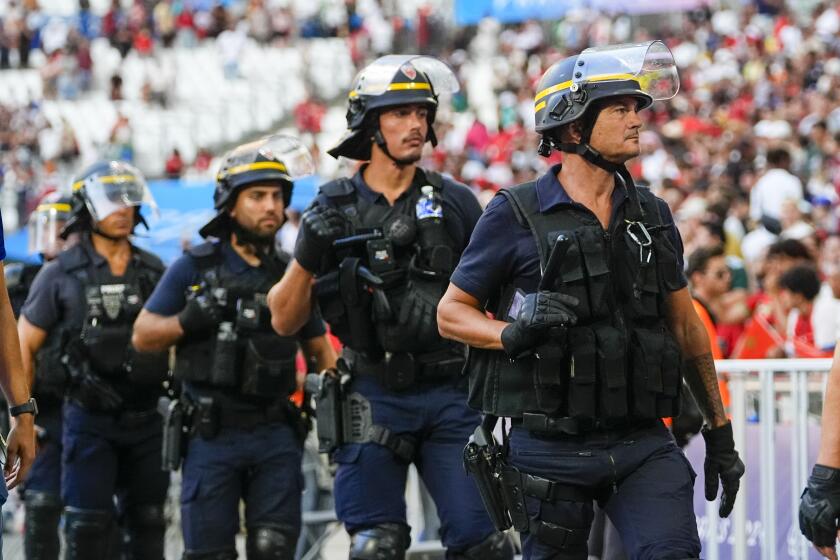Running for a chance at glory
His new legs arrived on a Saturday in late summer. They were made of carbon fiber, glossy and sleek and shaped like boomerangs.
Standing on them for the first time, Blake Leeper tested their flex. Just like the real thing, he thought, so alive.
“I was scared,” he says.
All his life, Leeper had worn what amputees call “walking legs,” which are built sturdy for getting around but are not so great for running or jumping.
Those legs had carried him through countless basketball and baseball games, from youth leagues to high school. But how many times had they kept him from grabbing a rebound? How often had they popped off as he rounded second base?
“They’d be lying in the dirt behind me,” he says. “You learn there are some things in life you can’t control.”
Things the young man from Tennessee had endured with a shrug and a tenacious smile. Now he had some help -- a pair of $30,000 prosthetics made for sprinting. Though everyone warned him to start slowly, he headed straight for the track at the local high school.
His parents came along. So did his prosthetist and the prosthetist’s wife because, in the small town of Church Hill, no one had ever seen legs quite like these.
Leeper walked the first 100 meters a little unsteadily. Then he began to run. Fast.
“The way the wind was hitting my face,” he says, “it was the feeling that had always been missing.”
So many frustrations evaporated in those few seconds. Leeper felt like a superhero in a comic book.
A cool breeze scuttles across the Olympic training center, a rambling complex of playing fields, sand volleyball courts and an archery range in the suburbs south of San Diego.
The early chill doesn’t make it any easier on Leeper as he emerges from the dorms, tired, and shuffles down to the track. The 22-year-old, just back from a meet in Manchester, England, prepares for his daily workout.
Cotton hose protect the nub ends of his legs, just below the knee. He slides into custom sockets, fiddling with valves that create a suction fit. His sprinting legs, too slender for anything other than straight-ahead speed, must be aligned perfectly.
An able-bodied runner stops by to chat.
“Blake is a little goofy,” says Yvette Lewis, an accomplished hurdler. “But he’s a hard worker.”
Olympic and Paralympic athletes train side by side at Chula Vista. Eager to field winning teams, the U.S. Olympic Committee pays to house them in the same compound with trainers, nutritionists and massage therapists.
No sooner has Leeper jogged a few warmup laps -- shaking the kinks from a compact, muscular body -- than his coach arrives. It is Joaquim Cruz, one of the greatest 800-meter runners ever.
A Brazilian who carries himself with the quiet confidence of track royalty, Cruz is not accustomed to losing; he doesn’t like hearing that Leeper ran poorly at the Paralympic World Cup event in England.
“This is all new to him,” the coach says. “Right now, he is trying to build some history of running.”
Four years after that first dash around the high school track, Leeper ranks among the top sprinters headed for the 2012 Paralympic Games, which will be held after the London Olympics this summer.
Although his times warrant a world ranking, he occasionally feels out of place in the realm of elite sports. That smile of his, framed by bright eyes and a scruff of a goatee, turns wistful as he says: “I did not plan for this.”
No one could explain to the Leepers why their youngest son was born without feet, ankles or calf bones. Doctors amputated his few dangling toes so he could wear prosthetics.
“They said he’d probably never play sports,” recalls his mother, Edith. “But we never put any restrictions on what he could do.”
The little boy tagged along with his older brother, Kris, who loved baseball and basketball. If neighborhood kids underestimated him, they did not make the same mistake twice.
“He played hard,” Kris says. “And if you told him he couldn’t do something, he practiced until he could.”
Leeper could swing a bat and shoot a basketball as deftly as anyone in Church Hill. The townsfolk got used to his making light of his disability.
Like the time one of his legs came loose during a game and he writhed around as if grievously wounded. Or the time he stepped onto the field with his feet pointed backward.
But frustration simmered beneath the jokes. Those legs kept him from being anything more than average and, after high school, his playing days appeared over.
At the University of Tennessee, Leeper studied applied physics, intent on developing high-performance prosthetics. Only then did he discover they already existed.
Ossur Cheetahs, developed by an orthopedic company in Iceland, were helping disabled athletes shatter Paralympic records around the world. One sprinter -- Oscar Pistorius of South Africa -- had managed an unprecedented crossover, racing in able-bodied meets.
Call it gut instinct or simply an impulse, but Leeper, who had never competed in track, imagined himself running beside Pistorius.
“Sometimes you see something and think, ‘I could do that,’ ” he says. “I just felt like I could do that.”
So began months of phone calls and emails. One Paralympic athlete referred him to another, who gave him the number for a coach. The trail eventually led to a nonprofit group in San Diego.
Leeper wrote to the Challenged Athletes Foundation in 2008, asking for a grant to pay for the Cheetahs, a pair of high-tech sockets and a specialist to fit all of this equipment to his legs. His father, Billy, helped draft the letter.
“We mailed it off thinking no one would give us those legs for free,” Billy recalls. “Who in the world would do that?”
The 2009 track season was in full swing by the time Leeper got his Cheetahs and felt steady enough to race. Billy packed everyone into the family car and drove 15 hours to Oklahoma.
When the new guy arrived at the UCO Endeavor Games, an annual competition for disabled athletes, other racers shook their heads.
“Man,” Leeper recalls one of them saying, “you’re going to get left behind.”
There was no hiding his lack of technique and experience. Billy says: “It was an ugly run. His legs were going sideways and everything.”
But somewhere in that jumble lurked God-given speed, if not years of pent-up energy. Leeper shocked everyone -- including himself -- by winning the 100-meter dash, then the 200 and 400. His times caught the attention of national coaches.
Weeks later, they put him on a plane to Brazil to represent the U.S. at an international meet.
“I’d never been out of the country,” he says. “I didn’t even have a passport.”
If Oklahoma had been intimidating, this meet was downright scary. A big crowd gathered at the stadium in Rio de Janeiro that day and the competitors gave each other cold, hard stares before the race. Leeper turned to Cruz for advice.
“How much experience do you have?” Cruz asked.
“This is the second meet of my life.”
The coach smiled. “Just be yourself.”
This is a guy who prefers Taco Bell, so the meat, potatoes and salad on his plate do not look especially appetizing. Muttering that the food at the Olympic training center is “pretty healthy,” Leeper reaches for a bottle of Worcestershire sauce.
“I’m a Southern boy,” he says. “Got to sneak some flavor in.”
The USOC invited him to live and train full time at Chula Vista in 2010. It was tough leaving college two years short of graduation, but he could not keep his mind off racing.
In this new life, he ran each morning and again after lunch. There were sessions in the weight room and afternoons spent nursing sore muscles with ice baths and massage. Evenings allowed just enough time to play spades or watch television before turning in early.
Everything the residents did was centered on training.
“At first I was like, ‘This is horrible,’ ” Leeper recalls. “Why do they live like this?”
But whenever he broke ranks, staying up late or going out for a beer, Cruz made him pay with tougher drills and longer hours on the track.
So Leeper has changed, proving himself through hard work and something else. As the coach explains, “It turns out we speak the same language -- basketball.”
Their mutual love of the game recently landed them on a court behind the athletes’ lounge, playing one on one. Cruz took it easy at first, until Leeper blew past him for a layup in those walking legs.
“Blake started talking trash,” Cruz says. “So I pushed him.”
Just as when he was young, Leeper refused to back down. Cruz says: “I love that attitude.”
Determination sustains the fledgling sprinter on those days when he glances around the Chula Vista track and wonders if he belongs. Or on those occasions when he lines up against Pistorius, who continues to race in Paralympic meets.
“Almost like a dream,” Leeper says. “Honestly, I’m still trying to comprehend it.”
The only thing he can do -- other than quit -- is to keep going. Later this month, Leeper will compete in the U.S. Paralympic trials, in which he is expected to earn a spot on the team in several sprint events.
The kid who always wanted to run fast, to break free, is eager to see where his legs will carry him next.
--
twitter.com/LATimesWharton
More to Read
Go beyond the scoreboard
Get the latest on L.A.'s teams in the daily Sports Report newsletter.
You may occasionally receive promotional content from the Los Angeles Times.







